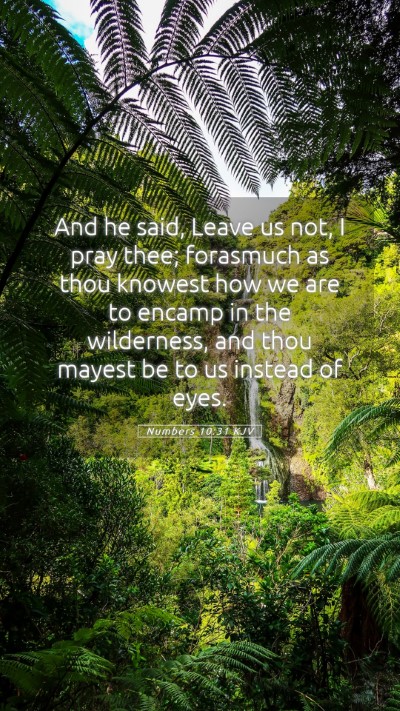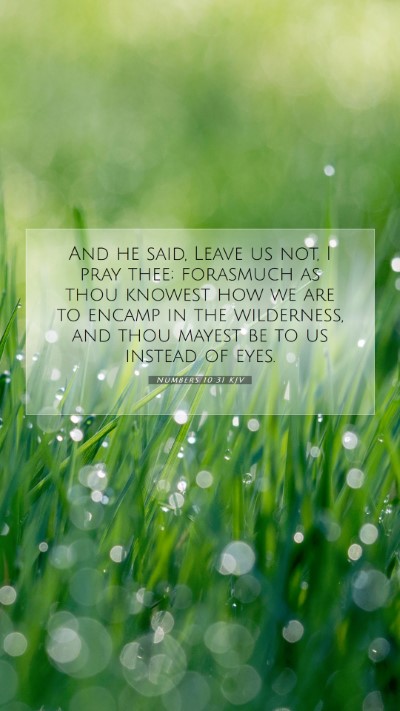Understanding Numbers 10:31 - A Comprehensive Insight
Numbers 10:31 states, "And he said, 'Leave us not, I pray thee; forasmuch as thou knowest how we are to encamp in the wilderness, and thou mayest be to us instead of eyes.'" (KJV) This verse provides a significant insight into the dynamics of leadership, guidance, and reliance on divine providence, particularly in the wilderness context of the Israelites’ journey.
This verse highlights the pivotal role of Moses in leading the Israelites through uncharted territories, emphasizing the importance of fellowship and wise counsel. To better understand the meaning of this Bible verse, we can draw upon interpretations and commentaries from acclaimed theologians such as Matthew Henry, Albert Barnes, and Adam Clarke.
Bible Verse Interpretations
Insights from Matthew Henry
Matthew Henry captures the essence of this verse through the lens of dependence on God's appointed leaders. He illustrates that the request made by Hobab, Moses' father-in-law, serves as an acknowledgment of the critical need for direction and insight in unfamiliar circumstances. Henry posits that Hobab's expertise "as an eye" reflects the importance of human guidance aligned with divine purposes, thus underlining the significance of community in faith.
Insights from Albert Barnes
Albert Barnes expands on the themes of trust and guidance in his commentary. He explains that Hobab's plea to remain with the Israelites symbolizes a deep-seated desire for security amid uncertainty. Barnes illustrates how Hobab's familiarity with the topography and routes of the wilderness made him an invaluable asset, paralleling how leaders within the church today serve to guide and direct believers in their spiritual journeys.
Insights from Adam Clarke
Adam Clarke's exegesis emphasizes the duality of the spiritual and the practical elements of this plea. He highlights that while Moses sought guidance from Hobab for the immediate physical journey, it also pointed to a broader spiritual seeking — to stay close to God’s guidance. Clarke articulately argues that our spiritual progress often requires both the divine leadership of God and the human wisdom of fellow believers, prompting reflections on how we engage with our community and leaders.
Scripture Analysis: Key Themes
- Divine Guidance: The plea for Hobab's presence symbolizes the Israelites' reliance on God’s guidance through earthly leaders.
- The Role of Leadership: This verse reiterates the importance of spiritual leaders who help navigate through life's trials and tribulations.
- Community and Fellowship: It emphasizes the necessity of close relationships within a community of faith for direction and support.
- Human Insight versus Divine Wisdom: It highlights the balance between seeking human wisdom and trusting in God’s ultimate authority in our lives.
Applying Biblical Teachings to Daily Life
Understanding Scripture, particularly Numbers 10:31, encourages readers to reflect on their own lives and the leadership they allow to influence their spiritual journey. Here are a few applications:
- Recognize the value of spiritual leaders in your life who provide guidance and insight.
- Seek out a mentor within your community, similar to how Hobab functioned as a guide.
- Engage in Bible study groups to discuss and explore various interpretations of passages to deepen understanding.
- Reflect on the ways you seek divine guidance and consider how you might also be a source of guidance for others.
Cross References
- Exodus 18:17-24 - Jethro advises Moses on delegating leadership.
- Deuteronomy 1:9-15 - Moses recounts the appointing of leaders for assistance.
- Psalms 32:8 - God promises guidance to those who trust Him.
Conclusion
Numbers 10:31 serves as a profound reminder of the necessity of fellowship, guidance, and leadership within a journey of faith. By recognizing the significance of this verse, we foster greater understanding of Bible verse meanings and Biblical exegesis, deepening our relationship with Scripture and our faith community. This verse applies not only to the historical context of the Israelites but resonates in modern-day spiritual practice, emphasizing the ongoing vitality of community and guidance in the life of a believer.


